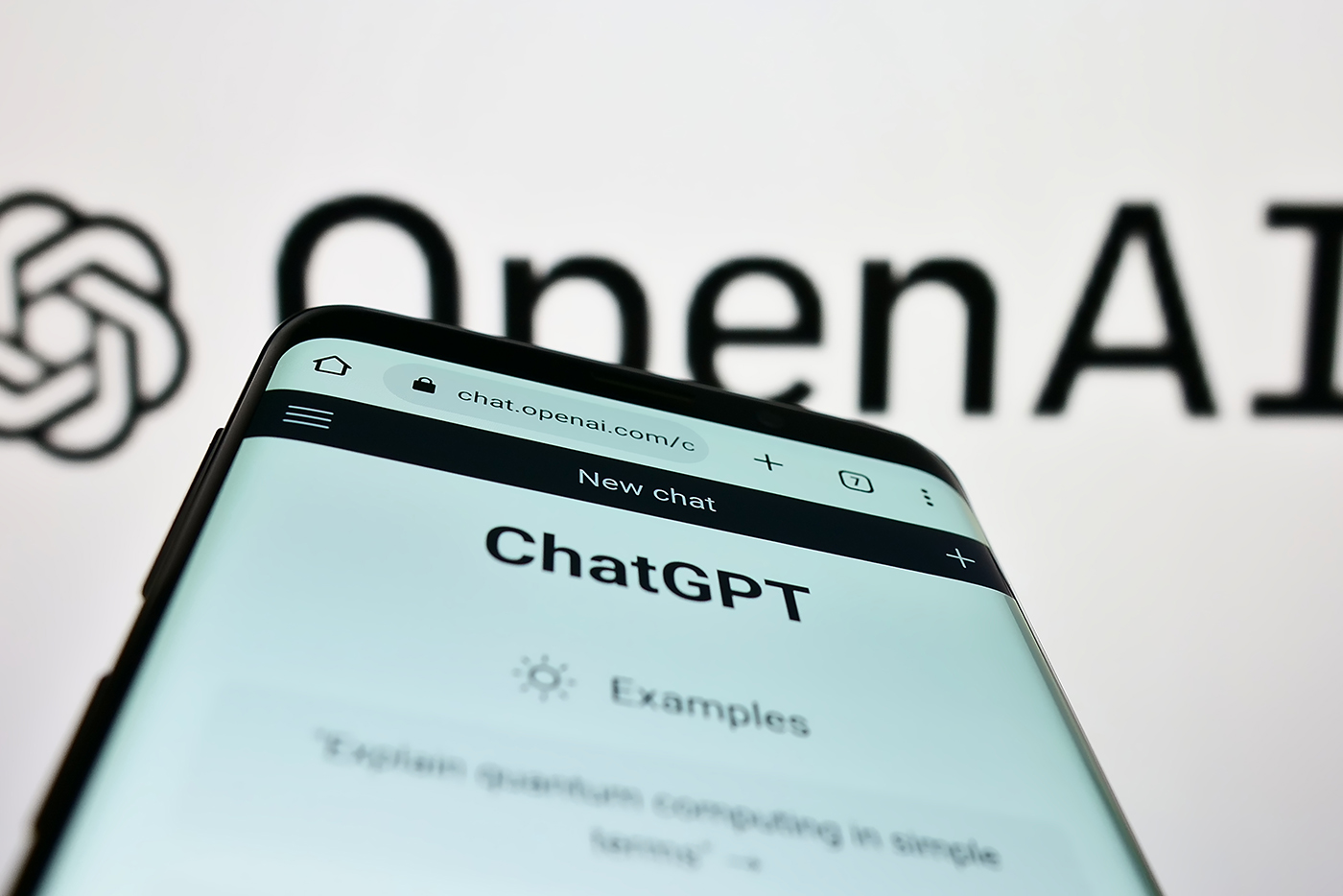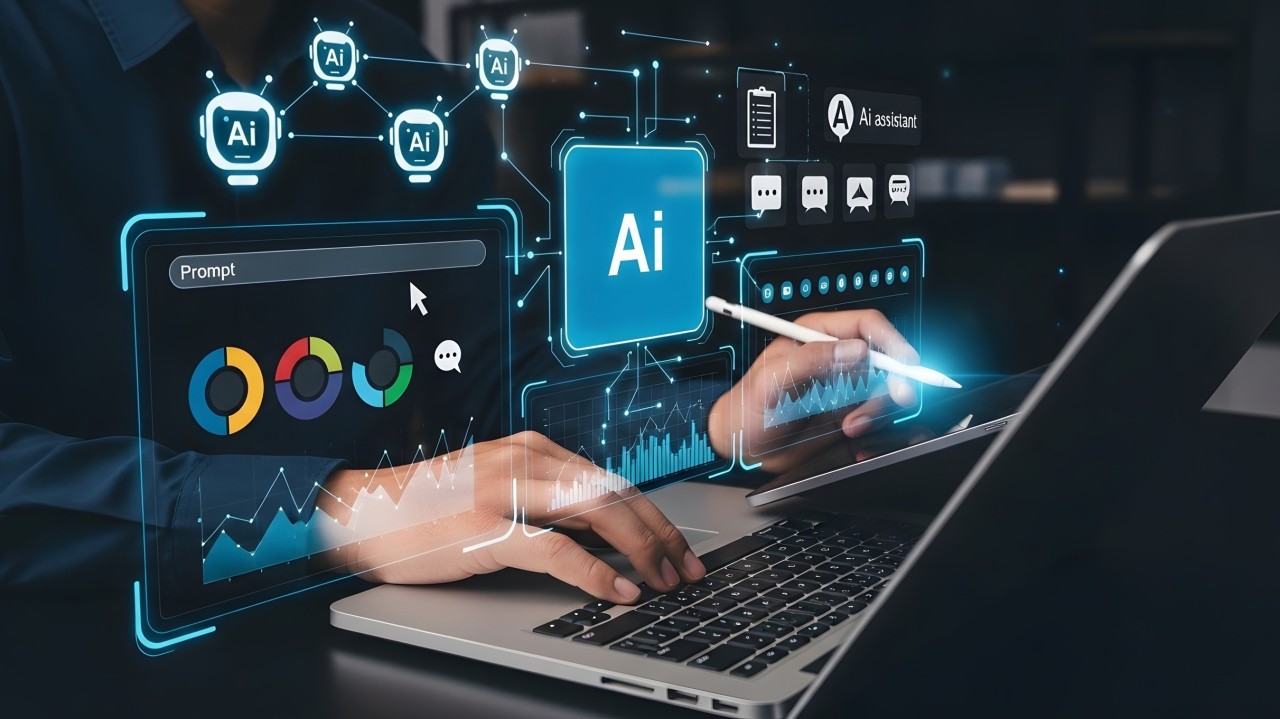What Does ChatGPT Really Mean For Your Job?
24 February 2023
Every now and then, a new application comes along that gets everyone excited (and perhaps a little scared) about the possibilities of artificial intelligence (AI). Right now, the app of the moment is undoubtedly ChatGPT – the conversational AI interface built on the GPT-3 large language model. More so than anything that has come before it, ChatGPT is capable of producing just about any kind of text or written output to a quality that – very nearly – appears as if it was written by a human.

Every time AI hits the headlines, it prompts discussions about whether it’s going to put humans out of work. The World Economic Forum, however, has stated that while some jobs may become redundant, people won’t. Instead, we should learn to work alongside AI, using it as a tool to augment our own skills while we automate the mundane and routine. The benefit of this is that it frees up our time to concentrate on developing and using skills that machines don’t yet have - and perhaps won’t for some time. These include strategy, innovating, complex problem-solving, and skills that require emotional intelligence and empathy.
So, what are the jobs where ChatGPT has the potential to make the biggest difference? Now, it’s important to note that this isn’t a list of jobs that I feel are going to be replaced outright by ChatGPT (or other natural language technologies). Rather, they are ones where it can be used to augment professional skills in order to make us more productive and efficient. If you work in one of these roles, I feel confident that it will pay off to consider that you have an exciting opportunity to incorporate cutting-edge technology into your day-to-day routine. However, it’s also an opportunity to hone human skills that are likely to become more and more essential for career progression as we move into the era of AI and automation.
Lawyer
ChatGPT and similar tools can assist lawyers by creating summaries of case notes and relevant laws and statutes, drafting documents such as contracts or agreements, and enabling lawyers to reduce the amount of time spent researching and typing up documents. This time can be better spent working face-to-face with clients, negotiating with opposing parties and their legal counsel, interviewing witnesses, and developing legal strategies. Ultimately, this is likely to help them provide more valuable and effective services to their clients and therefore become more useful in a professional capacity.
Copywriter
Copywriters are hired by businesses to sell their products by creating exciting and attention-grabbing text. As such, they probably won't want to simply ask ChatGPT or similar technologies to come up with adverts and slogans for them – for the simple reason that original thought is still needed to stand out from the crowd, and ChatGPT simply is not capable of original thought. Everything it produces is drawn from knowledge that already exists – it just puts information into a different order, so it looks new.
Good copywriting still requires (and will for some time) the human touch to convey personality, meaning, and brand voice in a way that seems authentic and human. However, ChatGPT can certainly assist with ideas for identifying these elements and suggesting ways in which copy can be made more entertaining or engaging. A good copywriter may choose to use ChatGPT to come up with sentences, straplines, and calls-to-action while incorporating previously-devised slogans, messaging, or wordplay.
Journalist
Journalism was one of the first professions to be augmented with AI, as outlets such as AP and Forbes have used AI to create automated reports involving simple, templated journalism, such as financial and sports reports for many years now. Recently, technologies like ChatGPT have enabled the creation of more sophisticated automated content, but most professional journalists would avoid using it to create reports and articles in their entirety. As with copywriters, their audiences will very quickly stop being interested in what journalists are writing if they aren’t having original thoughts of their own. It is, however, useful for creating article outlines, summaries, headlines, and features such as checklists of important points that should be covered.
Computer Programmer
As well as human languages, chat GPT is also able to produce code in a number of computer languages, including Python, Javascript, and C++. Fortunately for computer programmers who may not want to retrain for an entirely different career, it can't (yet) create programs that are very complex, as would be required to create modern software applications. However, if your job does involve creating computer code, then it can be very useful for creating short routines or breaking down bigger coding tasks into small components. It can also check existing code (or its own code) for bugs and errors.
Human Resources
HR professionals can use ChatGPT to write job descriptions, as well as automate routine tasks such as reporting on performance reviews, answering questions from potential new recruits, and creating material for onboarding new hires. Routine inquiries, such as where to find policy documents, or even more in-depth questions requiring analysis of those policies, can be outsourced to chatbots and conversational interfaces. It can also be used for tasks such as sentiment analytics to understand how workers are discussing a company on social media or what potential new hires think about the business. While it's doing this, HR professionals can dedicate their time to one-to-one, human contact with individuals that make up the company in order to build a better understanding of them and the challenges they face.
Data Analyst
For jobs that require analyzing data, ChatGPT and other similar technologies are very useful for creating reports, summarizing data, and translating insights into words. These reports can then be distributed throughout the organization to the decision-makers, who can use them to make more informed decisions. Although ChatGPT can’t create the type of visualizations that analysts often use to convey the insights they find (such as graphs, charts, and so on), it can assist with suggestions on how the data should be visualized, such as the best sort of charts to use, or the specific data points that should be included. Natural language AI can be used to tailor reports and statistics to individual audiences (marketing departments or c-suite, for example) and to format and order data within tables.
Customer Services
Customer service is a headline use case for conversational AI technology such as ChatGPT, as it can easily be used to power chatbots on the front line of handling incoming customer inquiries. Agents and managers can use it to automate the creation of answers to frequently asked questions and to author replies to enquires that come in via email. This then enables them to spend their time on tricky individual issues where a personal touch is needed in order to provide a satisfactory outcome for the customer.
Salesperson
As with other roles, ChatGPT will initially augment the work of sales professionals by automating simple, repetitive tasks, for example, entering information into a customer relationship management (CRM) database and writing letters of introduction to potential new customers. It will also power chatbots that will handle incoming sales inquiries. Salespeople themselves will find they have more time to spend on building relationships with their clients, identifying new sources of leads, and developing their salesmanship techniques and strategies.
Teacher
Teachers might today be worrying about their ability to spot students who are trying to cheat by handing in AI-authored homework. But they should also be thinking about how they themselves can put the technology to use in classrooms. For example, they can use ChatGPT to automate the creation of lesson plans, providing suggestions about structure and topics that should be covered in order to provide a thorough overview of a subject. They can also use it to create simple summaries of subjects, or use it to write round-ups and reviews of class activities, or create quizzes to test the knowledge of their students. Of course, one of the most valuable uses will be in teaching students themselves about the possibilities of AI – ensuring they are able to use it to answer questions and augment their own learning abilities.
Public Relations
Public relations (PR) professionals can take advantage of ChatGPT’s writing skills to create social media posts that communicate company news and wider messaging to the outside world. To do this, they will still need to develop an in-depth understanding of their brand's values and voice, just as they’ve always done, so they can “teach” AI to do this authentically. Technology of this sort can also be used to monitor media and social media for mentions of the company and its products, and to create summarized reports of who is talking about them and what they are saying. PR professionals that master these uses of AI and automation software will find they have more time to develop their skills in other aspects of their work, including building relationships with journalists and the media, and crisis management, which are also essential.
Related Articles
Is Autonomous Driving Ever Going To Happen?
By now, “smart” versions exist of just about every home appliance, gadget and gizmos we can think of. However, manufacturers continue[...]
AI And The End Of Progress? Why Innovation May Be More Fragile Than We Think
By now, “smart” versions exist of just about every home appliance, gadget and gizmos we can think of. However, manufacturers continue[...]
Dreamforce 2025: Why I’m Excited About Salesforce’s Agentic Enterprise Revolution
By now, “smart” versions exist of just about every home appliance, gadget and gizmos we can think of. However, manufacturers continue[...]
The Top 5 Technology Trends For 2026
By now, “smart” versions exist of just about every home appliance, gadget and gizmos we can think of. However, manufacturers continue[...]
The 7 Biggest Cyber Security Trends Of 2026 That Everyone Must Be Ready For
By now, “smart” versions exist of just about every home appliance, gadget and gizmos we can think of. However, manufacturers continue[...]
The 4 Myths Holding Back The AI Revolution, According To Nokia Bell Labs
By now, “smart” versions exist of just about every home appliance, gadget and gizmos we can think of. However, manufacturers continue[...]
Sign up to Stay in Touch!
Bernard Marr is a world-renowned futurist, influencer and thought leader in the fields of business and technology, with a passion for using technology for the good of humanity.
He is a best-selling author of over 20 books, writes a regular column for Forbes and advises and coaches many of the world’s best-known organisations.
He has a combined following of 4 million people across his social media channels and newsletters and was ranked by LinkedIn as one of the top 5 business influencers in the world.
Bernard’s latest book is ‘Generative AI in Practice’.










Social Media